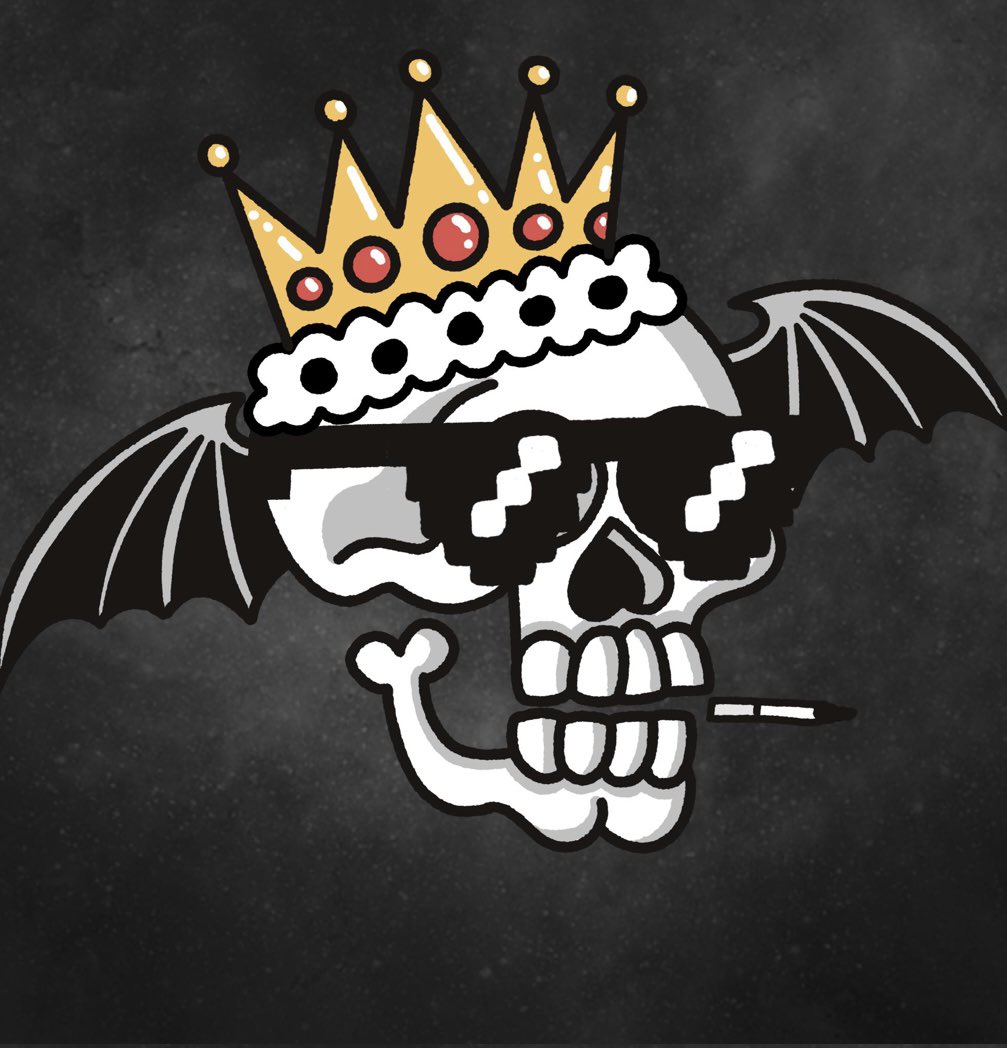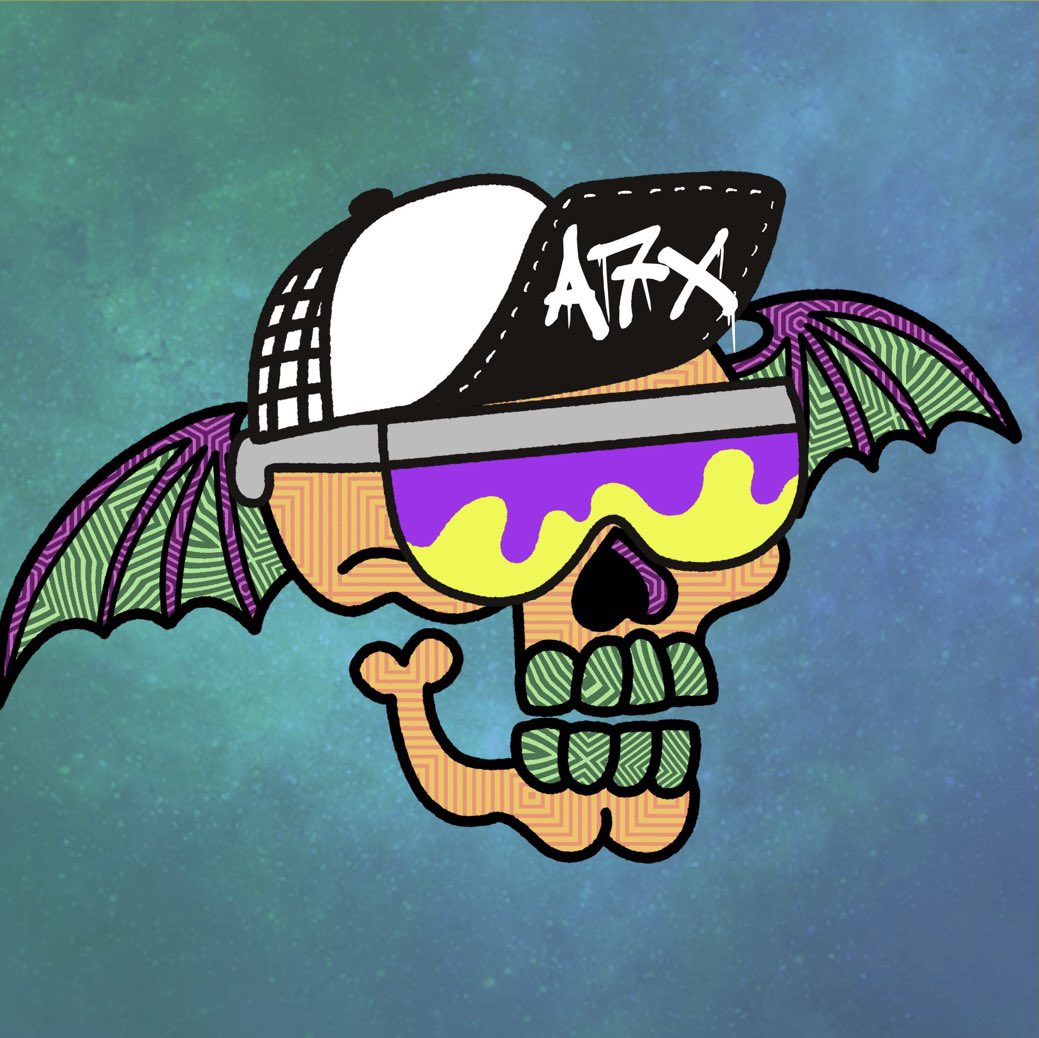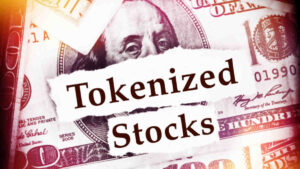Avenged Sevenfold frontman and crypto-genius M. Shadows on his epic NFT collection and buying ETH at $14

Pic: DKosig / iStock / Getty Images Plus via Getty Images
Here at Stockhead, our favourite heavy metals are the ones mined from the Pilbara. But when a publicist offered to put us in touch with Avenged Sevenfold frontman Matt Sanders (aka M. Shadows) to talk about his epic NFT collection and how he bought into Ethereum when it was $14, we sensed he’d have an amazing story to tell.
(A word of introduction for our older readers who be more into easy listening: Avenged Sevenfold is a California-based metal band that’s appeared on various lists of the “greatest metal bands of all time”. They’re not everyone’s cup of tea, but do check out their songs Hail to the King or Afterlife).
Sanders’ impressive 704-item collection of NFTs includes a Bored Ape, a Fidenza, a CryptoPunk, a dozen CrypToadz and Chromie Squiggles. (Dear reader, if those projects aren’t familiar to you, YNGMI — we’ve been cataloging many of them at Stockhead for months as they’ve exploded in value, selling on secondary marketplaces for millions of dollars in Ether.)
And yes, he’s also got his own project to promote – the Deathbats Club, a 10,000-strong NFT collection minting December 11 and 13 that’ll serve as a new fan club for the band. Holders will be entitled to perks like private merchandise sales, queue-jumping at A7X shows, physical and virtual giveaways and more.
Stockhead: So I’d love to hear your crypto voyage, how you discovered all of this.
Sanders: Great. Yeah. Do you want me to start from the beginning?
Stockhead: Absolutely. Yes!
Sanders: So I guess my crypto voyage was, I was always interested in things like space and technology and video games growing up.
I guess I heard about Bitcoin, probably in 2015 or ’16. And it just made sense to me. I didn’t understand the underpinnings of exactly what the blockchain was. But I understood the concept of internet money. And I just started kind of evangelising it and kind of preaching to everybody.
I remember being on a golf course one day with my buddy, and I just said, ‘Dude, we got to start buying this stuff, as much as we can’. And shortly after, Ethereum came out and I started learning about smart contracts, and getting a better idea of what smart contracts could potentially mean for moving forward into the future of the internet.
So we just bought as much as we could — at the time, there was a lot of hoops to jump through. Even with Coinbase, you had to send a picture of yourself holding your ID and they had all these limits (on the amount of Bitcoin you could buy).
It was very, very tough to get a lot but I got as much as I could, that my bank would allow.
And I just held it for a long, long time and evangelised it. And then beginning one year ago, I started hearing about the CryptoPunks.
Stockhead: Yeah.
Sanders: And there was finally something that I could spend my Ethereum on. And know, I started understanding the idea of digital assets and digital goods.
And one day I just decided to pull the trigger and buy a CryptoPunk. I think that was in February or March of this year.
Stockhead: Nicely timed!
Sanders: Yeah. I was really scared to buy it. It was a lot of money to put into something that was kind of new.
And then I bought it and something weird happened to me. I just started looking at it all the time and I felt really good about it. Started talking to everybody in the ‘Punks chat a lot.
And then I bought another one and another one and you know, then the Bored Apes came out and I minted Bored Apes.
The idea of this social club that they’re adding utility to, further past the ‘Punks… then I got into Art Blocks (home to the Fidenza and Chromie Squiggles projects).
I started just embedding myself in all these communities before anyone really knew that I was anything to do with Avenged Sevenfold … I was just this anonymous guy on in the Discord (chat server).
Stockhead: Oh my gosh…
Sanders: Did that for the last eight months and finally people found out who I was. Then it was kind of fun because I started doing Twitter Spaces with influencers like (Fractional Art director) DeeZe and all these people that I respect in the space that I’ve been watching for a while.
Jumped into @WickedCraniums twitter spaces and ended up chatting for a while. Love that my friend @JoelMadden is just as passionate about the space as I am and dropped some great knowledge. Great to hear your voice bro . Lets get you a Cranium. pic.twitter.com/FJpcTrWTIo
— M. Shadows (@shadows_eth) September 30, 2021
And now, just started a collection. So now I’m Mister Crypto Twitter guy, which is funny.
Stockhead: That’s amazing. Wow. And you were actually in on the mint of the Bored Apes, did I catch that correctly? (Author’s note: Bored Apes could be minted in April for 0.08 Ethereum, or around US$300 – but lately sell for at least 49 Eth, or US$212,000).

Sanders: Yeah. When that came out, a few of those. At the time, there wasn’t a lot of them selling out right away. One person got like 400 of them or something. That wasn’t something I was willing to do, but I got a couple and then I ended up buying on the secondary market. Trippy.
And I remember I sold it like two months later when it started exploding for nine Ether (roughly US$36,000). And I thought I was a genius.
Then it resold three months later for like 200 (about US$800,000).
Stockhead: Oh my gosh...
Sanders: I was like, Oh my god. So then I was like, okay, never sell.
Buy this stuff and just stay part of these communities and just live it.
And so that’s what I’ve been doing.
But I got to admit, the Bored Apes and (entrepreneur Gary Vaynerchuk‘s) VeeFriends is what made it click for me — that this is something that needs to happen for everybody that has an audience. Anybody that has something that they can offer.
[Author’s note: VeeFriends token holders get tickets to an in-person conference and access to Vaynerchuk both virtually and in-person]
It just makes everything so much easier, if you think about all the things we can do instantly just by having these people’s wallets and knowing that they have this token. Whether it’s airdropping stuff in the metaverse — which we’ve been building even before I bought my first NFT, in (Animoca Brands’) The Sandbox — to dropping them (virtual) clothes and fashion items.
If you look at all these things, having these tokens now is a no-brainer because it’s gonna set you up to be able to do whatever you want in the future.
Stockhead: Sure, yeah, I’ve heard that that is something that people with fan bases would want to do — everyone could have their own token, maybe Derek Token or something and their fans could collect it.
Sanders: Yeah, it’s almost like you can look at it a bunch of different ways. A band like us, we want to foster a larger community that we can be closer to.

Right now, we have something like 600,000 people on a free mailing list. What can you really do with 600,000 people on a free mailing list?
You certainly can’t drop them all free tickets. There are so many things you can’t do with them. There’s no club or any sort of like governance. These just can’t be run by something that has no barrier to entry. Right? It’s just kind of, you know, it’s just there.
And so what I’ve kind of found is that fostering these smaller communities, it’s almost like crowdfunding. They’re buying this initial token. There’s a small price to get in and then it’s your job on the back end, to add all sorts of value.
For us, a lot of things are simply free. Like meeting people at a meet and greet really is no skin off our back. It doesn’t cost us money. But it’s a cool thing that they love.
Or sending them a free guitar once a year or taking people out to golf. We have sponsors for that and they’re super happy to spread the gospel of, that’s the golf company, or this or that.
So we’re making these kinds of connections and to able to give it right back to the fans, as long as they’re putting in the work — and putting in the work is getting the token and being a part of the community.
And with the metaverse stuff, we’re building out what we believe will be the next layer of social media interaction … we’re building social hubs and casinos and we’re having video games in there, and we want the people that are token holders to be dressed nice. We’re going to drop them clothing, drop them Deathbat characters of their avatars, they can sell them on the secondary market if they want. We’re just dropping them.
So those are kind of the things that we have in mind.
And then beyond that, we’re thinking long term, music on the blockchain, fractionalising out publishing to token holders.
What we would love to do, instead of giving 70 per cent to Apple, or Spotify or to the label, we would much rather have that open dialogue with the fans where the accounting is right there.
We could say, ‘Hey, you guys helped us get here. We were getting money on the back end. We wrote this record, now you guys are going to share in profits’.
So that’s kind of … it’s like layer after layer after layer.
But right now, we’re simply selling the tokens so that that we can start.
Stockhead: Wow, that’s amazing. Tell me more about the Deathbats Club.
Sanders: So Deathbats is our logo. We’re taking the approach — we took a lot from the NFT world, like the traditional NFT world.
Grew this organically through Discord. There’s a collection of 10,000, where we have traits and attributes which are randomly assigned based off an algorithm …
Fixed the trippy to include the wings per a suggestion. To be honest, pig face puke breath is disgusting and I have no words. pic.twitter.com/ayZKtmogsI
— M. Shadows (@shadows_eth) December 2, 2021
You go to our website, you connect your Metamask, you pay 0.06 or 0.08 Ether — we haven’t decided on the price and we’re gonna wait till it gets closer because Ether’s so volatile — and then basically as soon as you press mint, the algorithms gonna shake everything up and send you something.

So you don’t know if you’re getting the free tickets for life… So that’s kind of the fun of it. That’s kind of the baseball card, you don’t know what you’re getting and everyone has a fair shot at all the big stuff.
And then after that, once it’s sold out, it’ll go into the secondary market where you can go to Opensea, and you can purchase from each other.
So I tell people, ‘listen, would you buy the Metallica fan club or buy the Patreon?’ You’re simply paying a subscription and you get nothing back for it.
With us, if this club builds and the better job we do, the more these are going to be worth and you can sell your membership back.
Basically what it is, you’re putting your little bit of money in and you’re hoping that at the end of the day, if you’re over Avenged Sevenfold, you’re sick of the community and you’re done, you can go sell it right back. Hopefully it’s going to be worth more than you when you bought it, or at least you had that experience — we’re pushing the limits here.
@DeathbatsClub pic.twitter.com/Ot7BE2Hl0p
— Avenged Sevenfold (@TheOfficialA7X) November 4, 2021
Stockhead: Wow, that’s amazing. Have you ever thought about a secondary career in finance?
Sanders: Yeah, my secondary career is trading NFTs.
Stockhead: Chuckles.
That’s so wild. So I’m the crypto reporter for Stockhead. We cover finance and NFTs, so I think our readers might be curious if you have any good alpha for them on any other projects that you like other than your own?
Sanders: Yeah, well in crypto I’ve always loved VeChain. I’ve been a fan of them. And I you know, I’m friends with (VeChain general manager) Jason (Rockward) over there, been invested in that a long time.
I think things like Solana and Cardano are going to be great, maybe for NFTs. They’re obviously quicker right now and they have a bunch of advantages but they also have disadvantages.
Then, to be honest, I invest with — I’m sure you know (Polychain Capital founder) Olaf Carlson-Wee.
Stockhead: Yes…
Sanders: So I’m in Polychain. A lot of my altcoins and that kind of stuff, I let them deal with it because they’re just killers.
Stockhead: Sure.
Sanders: I’d rather not sit there and deal with coins but in terms of projects, like I love Art Blocks Curated, I think that’s genius. I love obviously the blue chips. I love the CrypToadz, I love Cool Cats. I love the Bored Apes. I love CryptoPunks.

I think you’re never gonna go wrong with a CryptoPunk. You’re talking about the beginning of this revolution and the internet and Web 3.0 — when you can get the first thing that was on the blockchain there, I think it’s pretty important.
And I also love DeafBeef. I think he’s incredible.
Stockhead: … I’m sorry, what was the last thing you said? Death beef?
Sanders: It’s called DeafBeef. D-E-A-F, B-E-E-F.
And he’s a generative artist, and everything’s on chain. So an algorithm on a computer creates the music and the images and they’re incredible. I mean, it’s very expensive stuff, but if you can get your hands on one, I think it’s worth it.
The 8th and final Series 3 – Entropy token was minted this morning to @FingerprintsDAO multisig vault, where it will remain in “mint condition”. Entropy is a generative audiovisual work that will “degrade” each time the NFT is transferred. Sound On https://t.co/lX5wmeQdPv pic.twitter.com/8JNaWaC7iF
— 0xDEAFBEEF (@_deafbeef) November 24, 2021
Stockhead: Oh, and so when did you find the Fidenzas? (Algorithmically generated NFTs by artist Tyler Hobbs that are selling for millions of dollars.) Am I pronouncing that correctly?
Sanders: Oh man, I definitely missed the boat on that.
You know, so they were minting [for 0.17 Ether, or about US$400 at the time, in June]. I didn’t mint it. Then it went to one Eth, then two Eth, then three Eth, and I just kept saying, oh, it’s got to come down.
Stockhead: *Laughs.*

Sanders: It just kept going and I ended up aping in … I bought one on 12 Eth and I bought one at 25 Eth. Now the floor is obviously 150 or something like that right now. It worked out, but a lot of my friends minted them and it was such a killer thing to mint, but I definitely didn’t mint that unfortunately.
Stockhead: Wow. Well that’s still – I mean, getting in at 12 still sounds excellent.
Sanders: It’s really funny because there’s a guy named Jay Flez that was in the Punks chat one day, and he said, guys, I have word that Fidenzas are gonna get swept [meaning all the lowest-value pieces have been bought]. And at the time, the floor was like 12 [Ethereum]. And he said, they’re gonna go to 50 and I was like, okay, whatever.
And literally, an hour later the floor was 45.
I don’t know what he knew, but there was like some sort of fund or a venture capital group came in and just bought all Fidenzas. And I was like, Oh my gosh, so I always listen to Jay Flez now. All these anonymous people on the internet, so funny.
Stockhead: Wow, I have to follow him on Twitter. Excellent.
Any thoughts just on crypto itself? What do you think is going to be happening in the next couple of years? Where do you think this whole thing is going?
Sanders: I mean, I don’t know. I’ve always seen it as the future. So if you were to say what’s happening in 10 years, I’d say it’d be upon us.
What’s happening is three years? I mean, where does the rubber meet the road, right?
Where does legislation and how does the government handle it and what are they going to do? And I just don’t know.
Like I said, 10 years from now I know we’ll be past all these bumpy roads and it will be pretty much a crypto society in my opinion.
It’s just faster, it’s easier. It makes sense. I think it’s a no brainer.
But three years from now?
I’m interested, you know, I’m watching it. I’m not a guy that gets spooked though. I’m just gonna hold my stuff, buy my NFTs.
I believe NFTs are a no-brainer for gaming especially. It’s like, ‘Okay, kids, go spend $1,000 on your Fortnite skins and rent them the year and then give them back when you’re done’.
Or you can own them all. Right? All these games that are gonna be crypto native, it’s just going to be a complete no-brainer to people that you would rather own these things and be able to sell them back once you’re done with the game.
And the old model just doesn’t account for this.
So when you think about all these industries that are going to be kind of flipped and use NFTs it just seems like there’s no way we go back from here.
Stockhead: Yeah, yeah. I tend to agree. I’ve got my Star Atlas starship in a hangar somewhere.
Sanders: There you go. Yeah, so I think what’s gonna happen is you’re gonna have crypto-native games that come out. Right?
Like I have already seen so many [pitch] decks, where you buy the land, you build the level then you get paid with a governance coin.
Then you create your weapons and then you’re allowed to take them to other games.
And that’s going to be what happens because the big boys aren’t going to be able to adjust fast enough.
And there’s gonna be a bunch of people sitting around in these meetings, they’re gonna go, ‘Well, we’re happy selling $60 games and then owning all the IP, all these avatar and weapons.’ And they’re not gonna be able to move fast enough.
I kind of saw that with Sandbox, when I met Sébastian at Sandbox. [Chief operating officer Sébastien Borget of Animoca Brands’ The Sandbox virtual world]
He thought the Disneylands and the Coca-Colas were going to come in. And they didn’t.
It was Gemini and Coinbase and the Bored Apes and the ‘Punks, and they were all crypto native people that understood the metaverse.
They built and that’s why it’s taking off, because it’s not people trying to put a round peg into a square hole. Or a square peg or whatever.
It’s one of those things where it does not fit for all these big companies to kind of change that fast.
So we’ll see what happens but I’m pretty excited about it.
Stockhead: Wow, this has been so fascinating. Is there any other questions I should ask or things that people should know?
Sanders: One thing I’m trying to get through with all these interviews is that we’re not trying to jump on the NFT train. We understand the space. We’re trying to build something out to the future that we think is going to be extremely important.

And so one of the biggest problems that we’ve had is educating our fans. Because this is something that not only that does not compute, but it’s a leap of faith in what digital assets are.
But once you go down the rabbit hole, you realise that it clicks one day.
It’s like, ‘Oh, I get it like I get that my kid would want the Jordan jersey that Ninja is wearing in the Fortnite tournament and that’s more that that makes sense that you would want to pay for that because there’s now the blockchain where I can verify that.’
And so, the same way that we wear Nikes to school, they’re going to be wearing those in the metaverse and NFTs make sense there.
So it’s getting people to wrap their head around it, that we’re not just scamming them. Right?
They hear about scams, and they hear about Dogecoin and up and down and volatility and they instantly try to peg us to that.
But the point of these interviews really is just to get them to understand that we’re not doing that to them.
We’re not doing a rugpull after 21 years of getting their confidence.
We’re not trying to scam them.
Stockhead: Yeah, absolutely. Wow. Yeah, I’ll definitely make that point in the article. Well, thank you so much for your time. I’ve totally enjoyed chatting with you. This has been illuminating.
Sanders: Yeah, you too, man. I really appreciate it. I really do.
For more information about the Deathbats Club, check out their Discord channel and website.
.@DeathbatsClub presale will officially launch Dec 11th. Public Sale Dec 13th. pic.twitter.com/sdigpCR0rC
— Deathbats Club (@DeathbatsClub) November 17, 2021
The views, information, or opinions expressed in the interview in this article are solely those of the interviewee and do not represent the views of Stockhead.
Stockhead has not provided, endorsed or otherwise assumed responsibility for any financial product advice contained in this article.
For more crypto news, follow the author on Twitter, Stockhead’s crypto-themed Twitter account, and its Facebook page.
Related Topics
UNLOCK INSIGHTS
Discover the untold stories of emerging ASX stocks.
Daily news and expert analysis, it's free to subscribe.
By proceeding, you confirm you understand that we handle personal information in accordance with our Privacy Policy.








